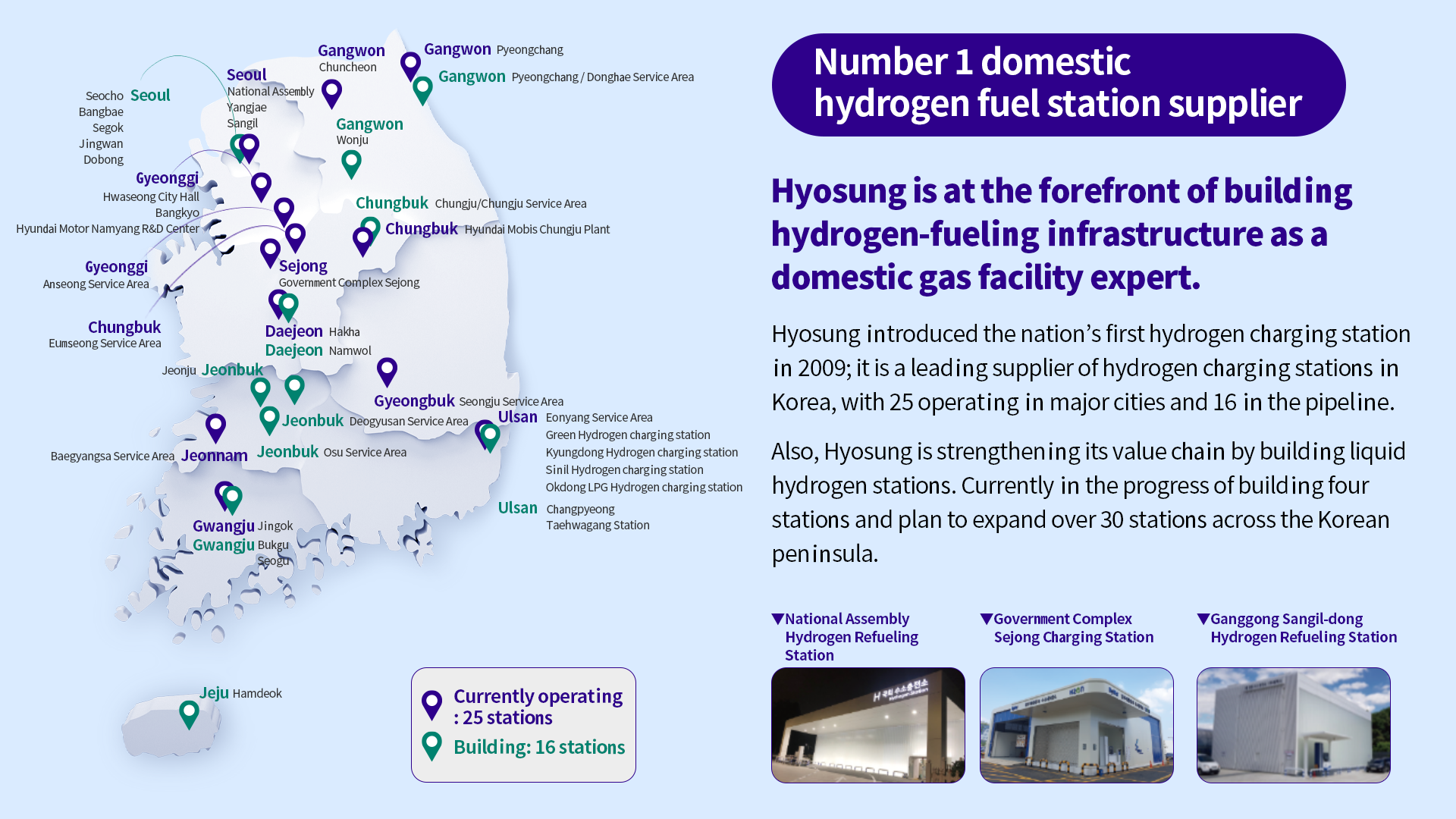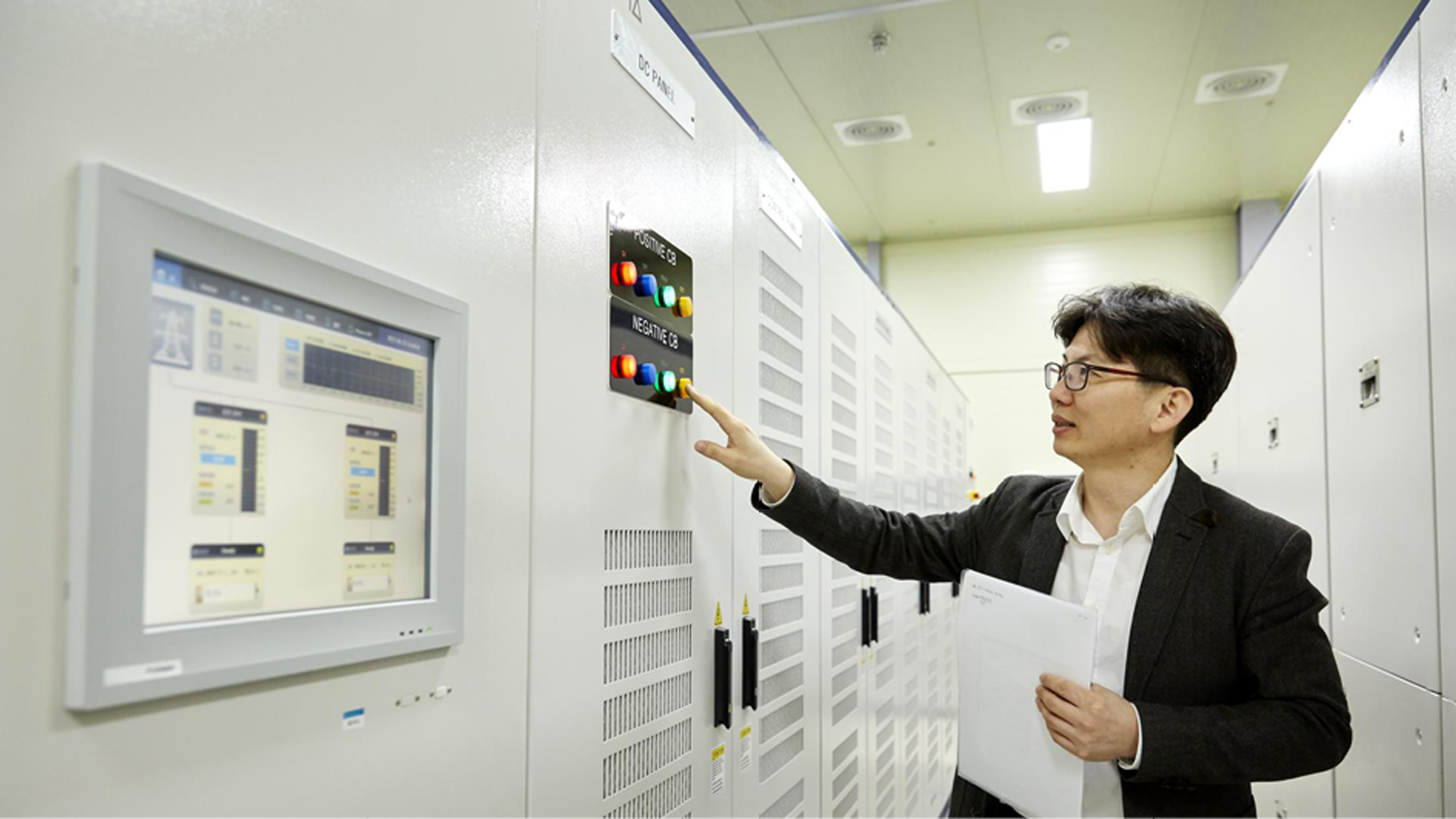Did you know the world’s first hydrogen law was introduced in Korea? Everything you need to know about hydrogen, as seen through Hyosung’s hydrogen business
2023.03.21
Did you know that the Republic of Korea was the first country to legislate a hydrogen law in the world? Yes, the Korean government promulgated the Hydrogen Economy Promotion and Hydrogen Safety Management Act or the “Hydrogen Act.”
Yet Korea is not alone. The world is spotlighting hydrogen energy; an energy source recently sought after the most in the world.
The U.S. Department of Energy has also announced the Hydrogen Program Plan, while U.S. President Biden promised a $9.5 billion fund to cut clean hydrogen costs and facilitate commercialization. The EU also has revealed the EU Hydrogen Strategy and launched the European Clean Hydrogen Alliance (or ECHA) as part of its efforts to transition to the hydrogen economy. China aims to meet a target of 1 million hydrogen vehicles by 2030.
What is it about hydrogen that makes it so much in demand?
More energy efficiency, lower greenhouse gas emission

The answer lies in its eco-friendly and economic characteristics.
With the growing call for doing away with fossil fuel usage to save our ailing earth from greenhouse gas, demand for electricity as an alternative to fossil fuels soared. Electricity can be generated by clean energy sources such as solar and wind power. However, they require huge installation space and are susceptible to climate conditions. That is where hydrogen comes in.
Unlike underground resources, hydrogen can be artificially produced with technology. It is the most abundant element in the universe, accounting for about 75 percent of its mass. It is a clean energy source that makes water when mixed with oxygen. It has the highest energy density of all known substances, promising excellent energy efficiency.
One might wonder. How come it takes so long for humanity to start utilizing it despite all the merits it offers?
Re-emerging as a promising energy resource
Humanity has long known about the possibility of hydrogen as an energy resource. When Apollo 11 made the first landing on the moon, it housed three hydrogen fuel cells. Hydrogen emerged as a promising energy resource in 1973 when the oil crisis hit the world.
With the shale oil boom, however, hydrogen was put on the back burner. While humanity was preoccupied with the low-price and fast development of energy resources without considering environmental consequences, the earth’s ecosystem has been collapsing rapidly. It has come to the point where the development of alternative energy resources for the sake of the environment and humanity can no longer be put on the back burner. Thus, hydrogen is rapidly gaining ground.
Now efforts are being put forth to find ways to use hydrogen in a more efficient and eco-friendly manner before the world transitions into a hydrogen economy.
Hyosung’s hydrogen business will provide the most idealistic way of utilizing the promising energy resource that could be a definitive answer to humanity’s present and future.
Hyosung is committed to hydrogen

The biggest stumbling block to the commercialization of hydrogen is the lack of charging infrastructure. No matter how efficient and eco-friendly it is, not many people will be ready to opt for the energy resource. In other words, they are going through a great deal of inconvenience due to the lack of supporting infrastructure, such as charging stations.
As such, Hyosung has been taking the lead in establishing a charging station network nationwide to facilitate our national paradigm shift into hydrogen. Starting from CNG and LCNG charging facility businesses in 2000, Hyosung has built its gas compression and charging technology and experiences over the past two decades.
Building on this, Hyosung introduced the nation’s first hydrogen charging station in 2009; it is a leading supplier of hydrogen charging stations in Korea, with 25 operating in major cities and 16 in the pipeline.
When it comes to nylon liner resins and carbon fibers, the essential materials for hydrogen storage containers, Hyosung is the main supplier. Storage of hydrogen requires high-pressure and ultra-light containers.
Hyosung TNC has developed and supplied Nylon liner resin for the first time in Korea. Hyosung Advanced Material’s proprietary carbon fibers, the fourth of their kind in the world weigh a mere 1/4 of that of heavy steel and 10 times the strength, suitable for hydrogen storage containers. Carbon fibers are also used for tanks for hydrogen vessels. Hyosung is to invest KRW1 trillion by 2028 to build an annual capacity of 24,000 tons to meet the growing demand for hydrogen cars.
The future of hydrogen will run alongside Hyosung’s hydrogen business
As with anything in life, there is always room for improvement. Hydrogen is no exception. It is a gas. When it is in gas form, its volume is huge, and it has to be stored at high pressure for efficiency’s sake. To store the high-pressure hydrogen gas stably, specially designed containers are required. Should the volume and weight of the gas increase, transportation costs and establishing charging stations would inevitably become challenging.
However, when it is cooled down to minus 253 degrees, it becomes liquid, called liquid hydrogen. Its volume is 1/800 that of gaseous hydrogen, which in turn requires less landmass for charging stations and lower costs for related facilities and transportation. It is also stored at atmospheric pressure with higher stability. On top of this, charging is more convenient and easier as it doesn’t ascertain levels of pressure during charging – the same way as you would fuel a gasoline vehicle in a gas station.
As such, liquid hydrogen is the key to a rapid transition to hydrogen energy. Hyosung has partnered with a global gas leader Linde Gas to build a liquid hydrogen plant to equip it with the liquid hydrogen production and charging network enabling large-scale storage and transportation. The plant, once built, is expected to kick off its operation by May 2023 in Ulsan, Korea, with a capacity of over 13,000 tons of liquid hydrogen. Upon launching the facility, Hyosung plans to invest KRW 1 trillion over five years to expand it to a capacity of 39,000 tons per annum.
Once the distribution of liquid hydrogen grows, it will naturally be followed by a rapid establishment of related infrastructure. As the cost of building charging stations gets cut, the saved-up funds can be funneled to build more stations. Hyosung is to establish a 30 liquid hydrogen charging station nationwide with the planned launch of the liquid hydrogen plant.
A greener hydrogen eco-system
It would be difficult to call hydrogen a true clean energy resource if its production process had entailed carbon dioxide emissions. Hyosung strives to develop the CCUS (Carbon Capture Utilization Storage) technology that captures carbon dioxide emissions at production.
The company is also leading the influx of the green hydrogen supply, produced by an electrolyzer based on renewable energy. It does not emit any carbon dioxide during the production process, and thus it is called the ‘ultimate green hydrogen.’ As the first Korean company to develop a 750kw wind turbine, Hyosung is also planning to build an 8MW wind farm.

When it comes to new and renewable energy, storage of produced energy is critical as it is vulnerable to surrounding environments such as climate. Hyosung is also a leading player in ESS or Energy Storage System in Korea.
A new era ushered in by hydrogen
The Hydrogen Council, a global initiative of leading companies, estimates up to 546 million tons of global hydrogen consumption by 2050, which will replace 13.26 billion barrels of crude oil and account for nearly 20 percent of the global energy demand.
Hydrogen stands to determine the future of humanity and the environment, and Hyosung has played and will continue to play a key role in our transition to a hydrogen society. As a holistic supplier responsible for the whole value chain encompassing production, transportation, and charging, Hyosung has been trailblazing the global industry. Please stay tuned with us while we at Hyosung continue to march into a new era of hydrogen!